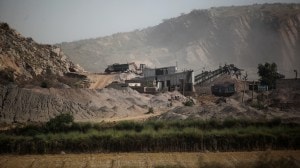Trial by Fire
A scene from the Ramlila: after Sita's agnipareeksha, Lord Ram says that although he believes that she is pure, he cannot take her back. ...

A scene from the Ramlila: after Sita8217;s agnipareeksha, Lord Ram says that although he believes that she is pure, he cannot take her back. He then tells Lakshman to take her to the forest. A spectator in saffron robes says: 8220;Bechare Ram8221;.
You wouldn8217;t be surprised at his mindset if you8217;ve seen Deepa Mehta8217;s Fire, the film that8217;s raising Shiv Sena temperatures. For the man with the misplaced sympathies is the guru of Ashok Kulbhushan Karbandha. And Ashok has become celibate as his infertile wife cannot have children. But he still has desires, and he sometimes asks his wife, Radha Shabana Azmi, to lie beside him in order to test whether he can overcome them. Radha8217;s desires, apparently, are non-existent; his fulfillment must be her fulfillment too.
And so it is, for Radha, as for countless other women across the country, and outside. And when Ashok8217;s younger brother Jatin Jaaved Jafferi marries Neeta Nandita Das, she too is expected to fit into the scheme of things without a murmur. In her case, she has to come to terms with a husband who is having an extra-marital affair.
Each night, both of them have to deal with the unoccupied bed beside them 8212; Jatin is with his lover who works at a beauty parlour, and Ashok goes to serve his Swamiji. And as Radha and Neeta work side by side, taking care of their mother-in-law Beeji, doing chores and cooking for the family eatery in the evening, they become closer as confidants, as allies and, after Neeta leaves her empty bedroom to go to Radha8217;s one night, as lovers. They find in each other the physical and emotional love they do not receive from their indifferent and self-absorbed husbands.
Yes, Fire depicts a lesbian relationship. But to say that it is about lesbianism does not do justice to either the movie or to lesbianism. The much-hyped lesbian relationship is not, initially, an actively determined choice against heterosexuality; it occurs more by default 8212; because the heterosexual relationships are all but non-existent.
Fire is a broader tale of change, loneliness and the duties one is expected to perform unquestioningly. Each character is realistic, and as an obvious extension, flawed. And each questions practices we take for granted, be it Jatin, who rails against the joint family and the joint account and has no qualms about renting X-rated video cassettes to 11-year old schoolboys. Or Neeta, who says, 8220;Itna bhi kya kartavya nibhana! How dutiful can you be!8221; Or the servant Mundu, who sneakingly watches blue films and masturbates, tormenting Beeji, who is under his care. Or the unspoken questions in the all-seeing eyes of Beeji, who has been left speechless by a stroke and communicates by ringing a bell.
The physical relationship between Radha and Neeta is a release, a rejuvenation, a re-awakening. It is a metaphor for freedom as it brings with it mental liberation, a breaking down of the invisible, ingrained barriers in thinking. In one scene, Beeji rings her bell incessantly, refusing to eat. Ashok doesn8217;t go to see what she wants; he waits for Radha to enter and tells her to feed Beeji. Radha replies, 8220;Why don8217;t you feed her today?8221; He repeats her words as if the idea had never occurred to him as in fact, it hadn8217;t and gets up to feed her. As Radha sits down, enlightenment spreads over her face, her eyes seem to see doors opening onto worlds unimagined, unknown worlds of shared responsibility, equal status, self-assertion.
That, for me, was the defining moment of the film a woman8217;s realization that things can be different. I went to the movie thinking that the name Fire symbolised passion. Halfway through, I learnt that it also stands for the agnipareeksha that every woman has to undergo in one form or another.
And at the end, when Ashok impassively watches Radha struggling to douse the flames on her sari, I realised that in India, the trial by fire is sometimes literal, that fire is also an oft-used weapon to get rid of a wife. The relationship has no easy culmination, neither for Neeta and Radha, nor for the others around them. Beeji8217;s all-knowing eyes and Mundu8217;s threat to reveal all make sure of that. When Radha catches him watching pornography, he defends himself: 8220;What other means of pleasure do I have?8221; And as Radha wonders, 8220;Is it so wrong to do what you desire?8221;, you are forced to ponder the consequences of your actions on others. The question remains unanswered.Each of us has to find an answer in our own life situation. Perhaps some of us never will. Perhaps that too is an answer.
- 01
- 02
- 03
- 04
- 05































